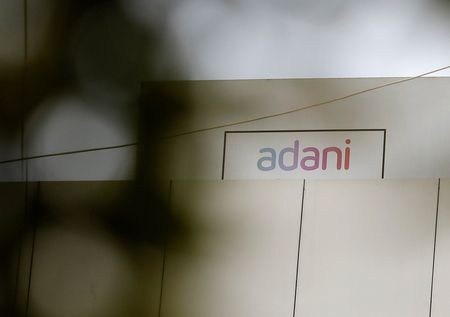By Urvi Dugar, Shankar Ramakrishnan and Jayshree P Upadhyay
(Reuters) -Hindenburg Research has denied allegations by India’s securities regulator that it colluded with a U.S. asset manager to use non-public information to set up a short bet against Adani Group last year, which if proven would breach the country’s rules.
Hindenburg posted a copy of a 46-page “show cause” notice from the Securities and Exchange Board of India (SEBI) outlining the allegations on its website on Monday, in the latest twist to a saga that began last year when the U.S.-based short-seller alleged improper business dealings by Adani.
The notice said that six entities including Hindenburg, Kingdon Capital Management and a Mauritius-based trading fund set up by Kotak Mahindra Bank violated certain rules under the Prevention of Fraud and Unfair Trade Practices regulation. It was dismissed in a statement by Hindenburg as “nonsense”.
Kingdon did not respond to an emailed request for comment on Tuesday. Hindenburg’s statement did not mention its relationship with Kingdon and did not respond to an email requesting comment.
“SEBI has neglected its responsibility, seemingly doing more to protect those perpetrating fraud than to protect the investors being victimized by it,” Hindenburg said in its statement on the notice, which two sources at SEBI with direct knowledge of the matter confirmed to Reuters was authentic.
SEBI said in the notice that it had received information from or through the U.S. Securities and Exchange Commission (SEC) in the course of its investigation.
Adani, which has consistently denied Hindenburg’s allegations, suffered a loss of as much as $150 billion in combined market value after the report, but its share price has since recovered to the same levels as before.
SEBI did not respond to a request for comment on Tuesday on Hindenburg’s statement or the show cause notice. If proven, the alleged breaches could result in financial penalties and the repayment of any gains deemed to have been illegal.
Hindenburg said in its statement that it made $4.1 million in gross revenue through “gains related to Adani shorts from that investor relationship” and just $31,000 through its short position of Adani’s U.S. bonds. It did not name the investor.
“It was a tiny position,” said Hindenburg, whose response sheds some light on its Adani short, which intrigued other investors because Indian securities rules make it hard for foreigners to bet against companies there.
SEBI alleges Hindenburg colluded with its client Kingdon Capital Management by providing a draft of its report on Adani Group before it was released publicly.
Mark Kingdon, the owner and founder of Kingdon Capital, then set up a fund able to trade Indian equities known as K India Opportunities Fund, SEBI alleges. That fund created short positions in Adani group stocks between Jan. 10, 2023, and Jan. 20, 2023, five days before Hindenburg’s report was published.
Founded in 1983, Kingdon had $639.2 million in assets under management in January, an SEC securities filing shows.
Kingdon manages two strategies: a global long/short equities strategy, which can also invest in credit, government securities, commodities and currencies opportunistically, and a long/short strategy focused on healthcare, the filing shows.
Hindenburg said a Mauritius registered unit of India’s Kotak Mahindra Bank created and oversaw an offshore fund structure used by its “investor partner” to bet against Adani’s shares.
Kotak Mahindra Bank said in a stock exchange statement late on Tuesday that neither the K India Opportunities Fund nor Kotak Mahindra International were aware that Kingdon entities had any association with Hindenburg.
The bank said that it has received a notice of allegations from the regulator, adding that no regulatory action had been taken against the fund.
Kotak Mahindra Bank shares fell as much as 3.93% on Tuesday.
(Reporting by Urvi Dugar and Manvi Pant in Bengaluru, Juby Babu in Mexico City and Carolina Mandl in New York: Editing by Krishna Chandra Eluri, Stephen Coates, Christian Schmollinger and Alexander Smith)





